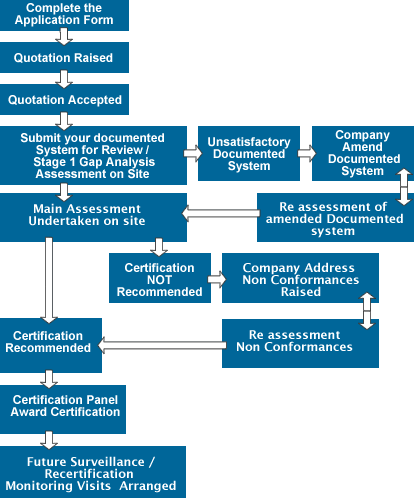Impartiality
The top management of the ECG Group are committed to ensure that all of our activities are carried out in an impartial manner - Being impartial, and being perceived to be impartial, is necessary for ECG to deliver our certification that provides confidence.
- We have ensured that all internal and external personnel are aware of the need for impartiality
- All of the ECG decisions are based purely on the objective evidence of conformity (or nonconformity) obtained by the audit team, and that our decisions are not influenced by other interests or by other parties.
- ECG via the design and maintenance of a business risk assessment have now created a process to clearly identify, analyse, evaluate, treat, monitor, and document the risks related to conflict of interests arising from provision of certification including any conflicts arising from our relationships on an ongoing basis. Where there are any threats to impartiality, then ECG have documented within the business risk assessment and are able to demonstrate how we have eliminated or minimised such threats and documented any residual risks
- The business risk assessment covers all potential threats that are identified, whether they arise from within ECG or from the activities of other persons, bodies or organisations. When a relationship poses an unacceptable threat to impartiality (such as a wholly owned subsidiary of ECG requesting certification from its parent), then certification is not provided.
- The ECG top management review any residual risks to determine if it is within the level of acceptable risk and this is ongoing at each management review meeting
- The risk assessment process that we have currently adopted includes the identification of and consultation with appropriate interested parties to give advice on matters affecting impartiality including openness and public perception. The consultation with appropriate interested parties has been balanced with no single interest predominating – this now talks the form of an advisory committee used for consultation for impartiality and membership of technical committees which when used with this business risk assessment is our means of fulfilling are commitment to providing an impartial assessment
Special audits
Expanding and reducing scopes
- ECG will in response to an application for expanding the scope of a certification already granted, undertake a review of the application and determine any audit activities necessary to decide whether or not the extension may be granted. This may be conducted in conjunction with a surveillance audit.
- ECG will in response to an application for extension/reduction to scope of a certification already granted, undertake a review of the application and the Certification/Deputy Manager using the contract review form decide the necessary audit activities either as a partial assessment covering the scope extension/reduction areas only (this may be carried out as part of a surveillance visit) or a full reassessment
Short notice audits
It may be necessary for ECG to conduct audits of certified clients at short notice or unannounced to investigate complaints, or in response to changes, or as follow up on suspended clients. In such cases:
a) ECG describe and make known in advance to the certified clients the conditions under which such audits will be conducted;
b) ECG do exercise additional care in the assignment of the audit team because of the lack of opportunity for the client to object to audit team members.
Suspending, withdrawing or reducing the scope of certification
ECG have a policy and documented procedure(s) for suspension, withdrawal or reduction of the scope of certification:
- Suspend certification in cases when, for example:
- The client’s certified management/product system has persistently or seriously failed to meet certification requirements, including requirements for the effectiveness of the management system
- the certified client does not allow surveillance or recertification audits to be conducted at the required frequencies;
- the certified client has voluntarily requested a suspension.
Under suspension, the client’s management/product system certification is temporarily invalid.
ECG will restore the suspended certification if the issue that has resulted in the suspension has been resolved. Failure to resolve the issues that have resulted in the suspension within 6 months will result in withdrawal or reduction of the scope of certification.
ECG will reduce the scope of certification to exclude the parts not meeting the requirements, when the certified client has persistently or seriously failed to meet the certification requirements for those parts of the scope of certification. Any such reduction is in line with the requirements of the standard used for certification.
What is an Audit and What is the Audit Process?
 "*The definition of an audit is: A systematic, independent and documented process for obtaining audit evidence and evaluating it objectively to determine the extent to which audit criteria are fulfilled". *(ISO 9000:2015)
"*The definition of an audit is: A systematic, independent and documented process for obtaining audit evidence and evaluating it objectively to determine the extent to which audit criteria are fulfilled". *(ISO 9000:2015)
What does this mean? Well it means that the senior management of Independent European Certification Limited are committed to provide your company with an impartial assessment process by effectively managing any conflicts of interest and ensures the objectivity of our management system certification activities by using skilled, competent auditors with experience in your industry. The auditor or audit team will ask you a series of questions about your business in relation to the standard for which you are applying and examine a sample number of records.
The auditors we employ are highly competent in looking at your particular industry and are trained to add value to your audit experience, which means that, whilst they are not permitted to give you advice, they are permitted to identify areas of improvement within your business to add value, perhaps reduce time and cost for example.
In simple terms they are a fresh pair of experienced and competent eyes looking to add benefit to the audit. Therefore Independent European Certification Limited believes the purpose of an audit is for improvement and/or positive correction and not an inspection activity.
The senior management of Independent European Certification Limited make publicly available within the Independent European Certification Limited offices their complaints and appeals procedures and a directory of valid certificates that at a minimum show the name, relevant normative document (i.e. ISO 9001:2008), scope and geographic location. All certificates issued can be validated on this web site under the tab client resources.
For clarification, once the initial report has been approved and certification awarded by the Certification Panel, the certificate reports three dates.
- Firstly, on a positive recommendation the certificate start date coincides with the date when the certification decision was made.
- Secondly, if any alterations are made to the certificate at a later date, these are recorded in the date of revision.
- Thirdly, all certificates are valid for a 3 year period, expiring three years after the date of the last day of the initial successful audit.
Receipt of Appeals and Complaints
On receipt of an appeal the Certification/Deputy Manager ensures that the appeal is recorded in the Appeals Registerwith the following information:-
- Appeal number
- Appellant
- Date received;
- Nature of the Appeal
The Certification/Deputy Manager sends a receipt to the appellant and validates the appeal and passes the information to the formed appeals panel.
The Certification/Deputy Manager appoints the Appeals Panel. For appeals against an Assessor's decision to issue an Improvement Action Report (MIAR), the Appeals Panel will co-opt another Independent European Certification Lead Assessor onto the Panel (independent of the appellant certification activity).
The Chairman of the Appeals Panel (elected by simple majority from their group) must ensure that an Appeals hearing takes place within 30 clear days of receipt of the appeal and the Appellant is given at least 7 days notice of the time and place of the hearing.
The Certification/Deputy Manager shall act as the Appeals Panel Secretary unless he has been involved in the subject of appeal in such case the Chairman of the Appeals Panel shall appoint another person to act as secretary.
Conduct of Appeals Panel
The appellant and the Assessor/Certification/Deputy Manager are entitled to be heard in confidence.
The panel reviews in detail the submission from the appellant the relevant Independent European Certification reports such as:-
- Assessment Checklists
- Improvement Action Reports
- Assessment Reports
- Certification Manager's review of reports
The documentation available is then examined and a decision made on the validity of the appeal. Decisions are made based on the Independent European Certification Quality Manual and the Operating Procedures, Regulations and the Scheme Description. The decision of the Appeals Panel as declared by its Chairman shall be final.
The Panel's decision on the matter is recorded in the meeting minutes, which are circulated to the Management Review Meeting and input into the Governing Board Meeting and the Certification/Deputy Manager updates the Appeals Register.
The Certification Manager then informs the appellant in writing of the Appeals Panel's decision. Any corrective and preventative actions following the complaint review will be recorded on the Improvement Action report (QA12) and progressed by the Certification/Deputy Manager who will carry out a follow up verification assessment to ensure that the corrective actions taken are effective in preventing recurrence or by the Deputy Certification Manager if the Certification/Deputy Manager was involved in the appeal
Review of Appeals
During the periodic Management Review and Board of Governors Meeting, all Appeals will be analysed to determine whether the action taken has been effective from the NCR and investigation information. This review will also determine whether there are any trends/similarities in the nature of complaints and determine what action should be taken in the light of such findings.
Receipt of Complaints
When a verbal complaint is received or dispute arises, it is recorded in the Complaints Register and a brief summary prepared on the Complaint Form and passed to the Certification/Deputy Manager and the complainant requested to put the complaint in writing (until it is confirmed in writing it is not forwarded to the Complaints Panel but investigated by the Certification Manager and reported in the form of a complaint log of the actions taken until the formal complaint in writing is received).
A written complaint (the only recognised formal complaint) is recorded in the Complaints Register and passed to the Certification/Deputy Manager who acknowledges receipt to the complainant and ensures that the complaint/dispute has been recorded in the Complaints Register with the following information and keeps at least every week or as detailed within the receipt letter a progress report to the complainant/appellant:-
- Complaint number
- Complainant
- Date received;
- Nature of the Complaint/dispute
- Complaint Form completed for verbal/telephone complaints.
The Certification/Deputy Manager appoints the Complaints Panel 3 people. For complaints or disputes involving an Assessor, the Complaints Panel will co-opt another Independent European Certification Lead Assessor onto the Panel and a Director of the company.
The Chairman of the Complaints Panel must ensure that a Complaints hearing takes place within 30 clear days of receipt of the complaint and the Complainant is given at least 7 days’ notice of the time and place of the hearing.
The Certification/Deputy Manager shall act as the Complaints Panel Secretary unless he has been involved in the subject of complaint in such case the Chairman of the Complaints Panel shall appoint another person to act as secretary and to keep the clients at least weekly involved or at another deadline as detailed in written correspondence with the complainer.
Conduct of Complaints Panel
The complainant and the subject of the complaint are entitled to be heard in confidence.
The panel reviews in detail the submission from the complainant and any relevant Independent European Certification reports such as:-
- Assessment Reports
- Certification/Deputy Manager's review of reports
The documentation available is then examined and a decision made on the validity of the complaint. Decisions are made based on the policies and procedures in the Independent European Certification Manual, Operating Procedures, Regulations and the Scheme Description.
Decisions are made on a majority voting basis.
The Panel's decision on the matter is final and is recorded in the meeting minutes, which are circulated to the Certification/Deputy Manager who updates the Complaints Register. The Governing Board is advised as of the nature of the complaint and the actions taken/resolution.
The Certification/Deputy Manager then informs the complainant in writing of the Complaints Panel's decision. Any non-compliance or corrective and preventative actions following the complaint review will be recorded on the improvement action report (QA12) and progressed by the Certification/Deputy Manager who will carry out a follow up verification assessment to ensure that the non-compliance or corrective actions taken are effective in preventing recurrence or by the Deputy Certification Manager if the Certification Manager was involved in the complaint/dispute/non-compliance.
Review of Complaints
During the periodic Management Review and Board of Governors Meeting, all complaints and disputes will be analysed to determine whether the action taken has been effective from the improvement action report and investigation information. This review will also determine whether there are any trends/similarities in the nature of complaints and determine what action should be taken in the light of such findings.
Corrective Actions
The Certification/Deputy Manager is responsible for determining the causes of nonconformity, correcting the nonconformities and for evaluating the need for actions to ensure that nonconformities do not recur; determines and implements in a timely manner the actions needed and records the results of the actions taken and reviews the effectiveness of the corrective actions
Preventative Actions
The Certification/Deputy Manager is responsible for taking preventative actions to eliminate the causes of potential nonconformities to be commensurate with the probable impact of the potential problems including the following:
- Identification of the potential nonconformity and their cause
- Evaluating the need for action to prevent the occurrence of the nonconformities
- Determining and implementing the necessary actions and recording the results of the actions taken
- Reviewing the effectiveness of the preventative actions


